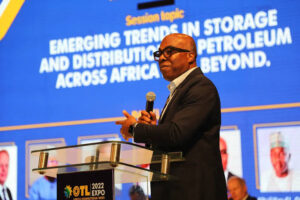The Nigerian Midstream and Downstream Petroleum Regulatory Authority (NMDPRA) has identified critical inefficiencies and cost challenges plaguing the country’s petroleum distribution infrastructure.
Speaking at the OTL Africa Summit in Lagos on Thursday, Mr. Ogbugo Ukoha, Executive Director of Distribution, Storage Systems, and Retail Infrastructure at NMDPRA, highlighted the urgent need for increased investment in coastal and port facilities to address these issues.
In his presentation titled “Nigeria Fuels Congress: Issues in Pricing, Policy, Profits and Market Access,” Ukoha underscored that enhancing infrastructure is essential to lowering operational costs.
He noted that current port limitations restrict the capacity to handle larger vessels, significantly inflating costs. “At MRS, we can only accommodate vessels up to 60,000 metric tonnes, while larger LR1 vessels can transport between 90,000 and 150,000 metric tonnes,” Ukoha explained.
He elaborated on the logistical hurdles, stating, “Previously, we could import petrol directly from Rotterdam using 90,000-ton vessels. Now, these vessels must anchor in Lagos for ship-to-ship transfers, resulting in smaller cargo deliveries and multiple, costly voyages.”
Ukoha revealed that charter costs can range from $50,000 to $100,000 per day, further compounding operational inefficiencies. “These inefficiencies are manageable.
It’s not just about the availability of coastal vessels; the inadequately deep channels also play a significant role. All these factors contribute to rising costs,” he said.

To mitigate these challenges, Ukoha called for substantial investments in coastal infrastructure, including dredging and upgrading ports to accommodate larger vessels, thereby reducing transportation expenses.
He referenced a recent inspection that demonstrated the limitations of current infrastructure, noting, “Just days ago, we saw vessels queued at Escravos due to one vessel grounding, causing significant delays. Ports like Warri, Koko, and Oghara have only a 6.5-meter draft at their entrances, which poses grounding risks.”
Ukoha emphasised the need for securing proper investments and funding, urging commercial banks to collaborate with investors in the sector. He stressed that adequate funding could drastically lower operational costs and enhance efficiency.
He pointed out that facilities in Lekki, particularly those of Pinnacle and Dangote, are among the few equipped to handle large vessels, while the Apapa Jetty requires urgent upgrades to meet operational demands.
“Only in Lekki do we have Single Buoy Mooring (SBM) facilities capable of receiving MR1 vessels. We need more such facilities and significant improvements at Apapa Jetty,” he stated.
Ukoha also lamented the heavy reliance on trucking for distribution, which he deemed both costly and risky. He advocated for investments in pipeline infrastructure, stating, “Pipelines are the most efficient means of transporting products globally, and we must return to that. While rail transport presents opportunities, our current dependence on trucks is unsustainable.”
He highlighted the dangers associated with trucking, citing a tragic incident in Jigawa where over 70 unidentified victims of trucking accidents were discovered in a mass grave. “This is a tragic reality, and we need to encourage more investment in pipelines,” he added.
Ukoha stressed the importance of leveraging technology to combat petroleum diversion, particularly near Nigeria’s borders. “Given our extensive borders, the risk of product diversion is significant.
Although monitoring borders isn’t NMDPRA’s primary responsibility, we work closely with Customs under Operation Whirlwind. The regulator is also considering mandating automated trucks for better visibility of petroleum product movements,” he noted.
He called for the full automation of licensing operations within the regulatory framework and encouraged marketers to adopt these technologies for increased transparency.
Regarding retail outlets, Ukoha proposed incentivizing customer-centric and profitable retailers to foster industry improvements. “Before the unbundling of the Department of Petroleum Resources (DPR), retail outlets were required to store diesel, kerosene, and petrol. As we shift toward LPG and CNG, we need to promote diversification in retail offerings.”
Ukoha also discussed NMDPRA’s plans for a national strategic petroleum reserve, which aims to stabilize supply and prices during emergencies.
He outlined a recent regulation mandating a 60-day storage capacity for all petroleum products, which he believes will be crucial in addressing supply challenges, particularly during incidents like the recent floods threatening northern Nigeria’s product supply.
He concluded by emphasizing that the strategic reserve regulation is designed to create a resilient supply chain capable of withstanding unforeseen disruptions rather than merely locking up capital.




